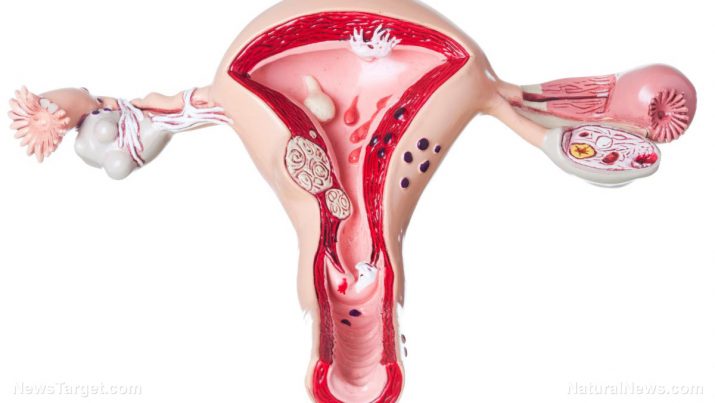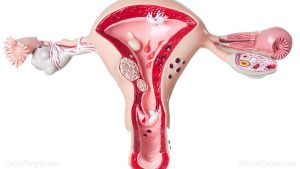
Ovarian cysts – causes, side effects and treatments at NaturalPedia.com
Saturday, May 26, 2018 by Zoey Sky
http://www.naturalpedia.com/ovarian-cysts-causes-side-effects-and-treatments-at-naturalpedia-com.html

Ovarian cysts, which are sacs that contain fluid or semisolid material, develop in or on the surface of an ovary. Most women will develop at least one cyst in their life lifetime. Cysts are usually painless and cause no side effects.
While there are various types of ovarian cysts, functional cysts are the most common. There are two types of functional cysts:
- Corpus luteum cysts – Follicle sacs often dissolve after releasing an egg, but if the sac doesn’t dissolve while the opening of the follicle seals, additional fluid may form inside the sac. This accumulated fluid then turns into a corpus luteum cyst.
- Follicle cyst – An egg grows in a sac (or follicle) during a woman’s menstrual cycle. The sac is found inside the ovaries and it usually breaks open and releases an egg. However, if the follicle doesn’t break open, the fluid inside it may form a cyst on the ovary.
Other women may develop a condition called polycystic ovary syndrome (PCOS). The ovaries of a woman with PCOS has many small cysts that may cause the ovaries to enlarge. If left untreated, PCOS may cause infertility.

Known symptoms of ovarian cysts
Patients with ovarian cysts don’t usually experience any signs. However, they may start having symptoms once the cyst grows.
The signs of ovarian cysts can include:
- Abdominal bloating or swelling
- Breast tenderness
- Nausea and vomiting
- Painful bowel movements
- Painful intercourse
- Pain in the lower back/thighs
- Pelvic pain before/during the menstrual cycle
If you experience these severe symptoms, consult a healthcare professional immediately:
- Faintness or dizziness
- Fever
- Rapid breathing
- Severe or sharp pelvic pain
These symptoms can be caused by a ruptured cyst or an ovarian torsion, which both require immediate medical attention.
Risk factors for ovarian cysts may include:
- Non-cancerous ovarian cysts – If a pregnant woman has high hormone levels, her growing baby daughter may develop ovarian cysts before she’s born.
- Ovarian cancer – Ovarian cancer is the major cause of cancer death in women. At least 15,000 women die because of ovarian cancer yearly.
Body systems harmed by ovarian cysts
Ovarian cysts may cause the following complications:
- Cancerous cystic ovarian mass – Ovarian cysts are usually benign and they resolve on their own. In rare cases, a cancerous cystic ovarian mass may be detected during a routine examination.
- Ovarian torsion – This occurs when a large cyst causes an ovary to move or twist from its original position. Ovarian torsion may cut off blood supply to the ovary. Without immediate treatment, it can cause damage or death to the ovarian tissue.
- Ruptured cysts – A rare complication, ruptured cysts may cause intense pain and internal bleeding. Ruptured cysts may increase the risk of an infection and they can be fatal if left untreated.
Food items or nutrients that may prevent ovarian cysts
The following foods or nutrients can help prevent ovarian cysts:
- Apple cider vinegar (ACV) – Rich in potassium, ACV can help shrink and dissolve ovarian cysts that form due to potassium deficiency.
- Beetroot – Beetroot has a compound called betacyanin that improves the liver’s ability to flush toxins from your system.
- Dandelion – Dandelion greens can help reduce the occurrence of cysts in women.
- Echinacea – A traditional Native American herb, echinacea can help alleviate some types of cysts. It can also help treat acne cysts.
Treatments, management plans for ovarian cysts
Treatment for ovarian cysts can help shrink or remove the cyst if it doesn’t resolve on its own or if it grows larger.
- Laparoscopy – This procedure can remove small cysts that are discovered during an imaging test to rule out cancer. During a laparoscopy, a surgeon will make a tiny incision near the navel and insert a small instrument in the abdomen to remove the cyst.
- Laparotomy – This procedure can remove a large cyst. During a laparotomy, a surgeon will make a large incision in the abdomen. An immediate biopsy will be conducted and if the cyst is cancerous, a hysterectomy will be performed to remove the ovaries and uterus.
Where to learn more
- 7 Home Remedies to Get Rid of Cysts & Fibroids Naturally
- Combination Of These 2 Ingredients Kills Cysts And Fibroids Naturally
- How to Eliminate Side Effects of the Mirena IUD Such as Bleeding & Weight Gain – A Mirena Crash Remedy
- Infertility does not have to be your destiny: How my wife healed without drugs or surgery
- Non-Surgical Treatment for Ovarian Cysts in Ayurveda
Summary
Ovarian cysts are sacs that contain fluid or semisolid material that develop in or on the surface of an ovary.
Ovarian cysts can cause abdominal bloating or swelling, breast tenderness, and nausea and vomiting.
Ovarian cysts may cause complications like ovarian cancer.
Sources include
Tagged Under: Tags: ovarian cysts





